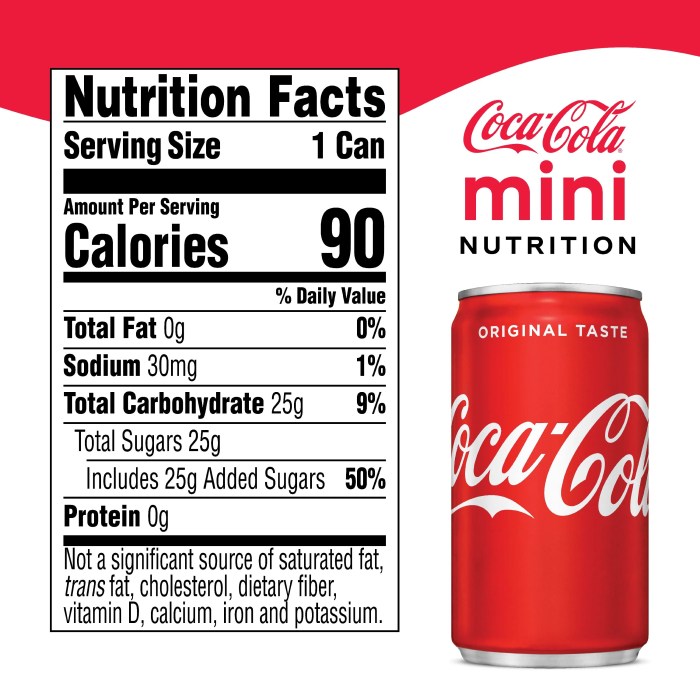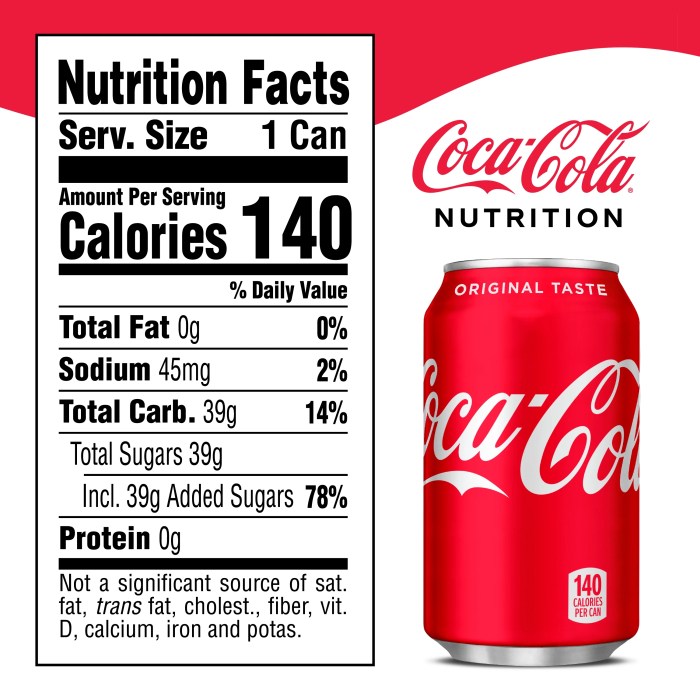Ingredient Analysis: 12 Oz Coke Nutrition Facts

12 oz coke nutrition facts – Let’s delve into the components of a 12-ounce can of Coca-Cola, examining each ingredient’s role and potential impact on our health. Understanding the ingredients is crucial for making informed choices about our consumption. This analysis will provide a clear picture of what we’re actually imbibing.
Carbonated Water
Carbonated water forms the base of Coca-Cola. It provides the fizz and refreshing sensation we associate with the drink. The carbonation itself, while enjoyable, can contribute to bloating and gas in some individuals, especially when consumed in large quantities. The water itself, however, is a vital component of our daily fluid intake.
High Fructose Corn Syrup
This is a significant source of sugar in Coca-Cola. High fructose corn syrup is a sweetener made from corn starch, processed to yield a mixture of fructose and glucose. Its high fructose content is metabolized differently than sucrose (table sugar), potentially contributing to increased levels of triglycerides and visceral fat, increasing the risk of metabolic syndrome, type 2 diabetes, and heart disease.
Many studies link high fructose corn syrup consumption to these health concerns.
Caramel Color
Caramel color is added for its characteristic brown color. It’s produced by heating sugars, and various types exist, some of which may contain trace amounts of 4-methylimidazole (4-MEI), a chemical classified as a possible carcinogen by some regulatory bodies. However, the amounts present in Coca-Cola are generally considered to be within safe limits.
Phosphoric Acid
Phosphoric acid acts as an acidulant, providing the tartness and tangy flavor of Coca-Cola. It also helps to preserve the beverage and contributes to its shelf life. Excessive consumption of phosphoric acid can potentially lead to calcium loss from bones, increasing the risk of osteoporosis, especially when combined with a low calcium diet.
Caffeine
Caffeine is a naturally occurring stimulant found in the kola nut, a key ingredient in Coca-Cola’s original formula. It provides a stimulating effect, increasing alertness and energy levels. However, excessive caffeine intake can lead to anxiety, insomnia, and heart palpitations. Moderate consumption is generally considered safe for most adults.
Natural Flavors, 12 oz coke nutrition facts
Coca-Cola’s “secret formula” includes a blend of natural flavors, which contribute significantly to its unique taste. The exact composition remains proprietary, but these flavors likely include extracts and oils from various plants, providing a complex sensory experience. While generally safe, the potential impact of these flavors varies based on the specific components used.
The sugary song of a 12 oz Coke, a symphony of simple carbohydrates, contrasts sharply with the comforting, cheesy notes of a different culinary composition. For a deeper dive into the nutritional landscape of creamy pasta perfection, consult the detailed breakdown of kraft macaroni and cheese nutrition facts , a counterpoint to the fizzy sweetness of that twelve-ounce bottle.
Returning to our cola, remember its subtle, yet significant, impact on our daily caloric intake.
Citric Acid
Citric acid, another acidulant, contributes to the overall flavor profile of Coca-Cola. It enhances the tartness and balances the sweetness. While generally considered safe, large amounts of citric acid may erode tooth enamel.
Aspartame (in Diet Coke)
While not present in regular Coca-Cola, Diet Coke and other diet versions utilize aspartame as an artificial sweetener. Aspartame is a low-calorie alternative to sugar, but concerns remain regarding its potential long-term health effects. Some individuals report headaches and other adverse reactions after consuming products containing aspartame. However, major regulatory bodies generally consider aspartame safe within acceptable daily intake levels.
Serving Size and Consumption Patterns

Understanding the serving size of a 12-ounce Coca-Cola and how frequently it’s consumed is crucial for assessing its impact on overall health. While enjoying a can occasionally might not pose significant issues, regular consumption of multiple servings daily can contribute to various health concerns.The effects of consuming multiple 12-ounce Coca-Cola servings daily are primarily linked to its high sugar content.
Excessive sugar intake is associated with weight gain, increased risk of type 2 diabetes, heart disease, and dental problems. The added sugars in Coca-Cola provide empty calories, meaning they offer little to no nutritional value. Consuming several servings daily significantly increases the intake of these empty calories, leading to a caloric surplus that the body stores as fat.
This can result in a substantial increase in body weight over time, potentially impacting various aspects of health and well-being.
Responsible Consumption of Sugary Drinks
A balanced approach to sugary drink consumption emphasizes moderation and the exploration of healthier alternatives. Moderation means limiting the intake of sugary drinks to occasional treats rather than daily habits. This conscious choice helps control sugar and calorie intake, minimizing potential health risks. Switching to healthier alternatives, such as water, unsweetened tea, or sparkling water with a squeeze of lemon or lime, offers a refreshing and significantly lower-calorie option.
These alternatives provide hydration without the added sugars and empty calories present in sugary drinks. Infusing water with fruits like berries or cucumbers adds natural sweetness and flavor without compromising health.
Calorie Intake from Various Serving Sizes of Coca-Cola
The calorie content of Coca-Cola directly correlates with its serving size. Larger servings naturally contain more calories. Understanding this relationship empowers individuals to make informed choices about their consumption.
| Serving Size | Calories |
|---|---|
| 12 oz | 140 |
| 20 oz | 230 |
Note: Calorie counts can vary slightly depending on the specific Coca-Cola product and manufacturing processes. These values are approximate averages.
Query Resolution
What are the artificial sweeteners in Coca-Cola?
Coca-Cola Classic does not contain artificial sweeteners; its sweetness comes solely from sugar.
Does Coca-Cola contain caffeine?
Yes, Coca-Cola contains caffeine. The exact amount varies slightly depending on factors like bottling and temperature, but a 12-ounce can typically contains around 34mg.
How does Coca-Cola compare nutritionally to Diet Coke?
Diet Coke is significantly lower in calories and sugar than regular Coca-Cola because it uses artificial sweeteners instead of sugar. However, some individuals may find the artificial sweeteners have their own potential health implications.
Are there any long-term health risks associated with consuming multiple 12 oz Cokes daily?
Yes, regular consumption of multiple 12-ounce Cokes daily is strongly linked to increased risks of weight gain, type 2 diabetes, heart disease, and other health problems due to the high sugar content.
